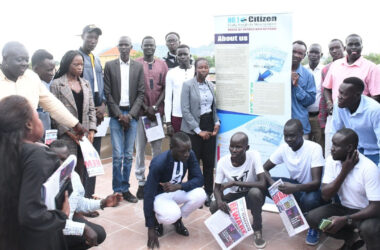By Malek Arol Dhieu
It is true that corruption is found in every society, but more in societies where corrupt individuals are celebrated, praised and followed for their ill-gotten wealth, instead of being spotted, harassed and reported to the concerned authorities for judgement.
When one is adequately educated, one knows the consequences and tragedies of corruption clearly detailed in all the ladders of education, with tertiary education speaking much about it and primary and secondary education speaking much about results of corruption in the then societies.
An adequate education, in addition, makes one predict the consequences when caught, and children’s safety in interaction within and outside the society. Education becomes one’s intuitive advisor in all activities one is involved in, and in case the environment makes one acquire corruption, one has to use a tea-stirring spoon in consuming public money so that intervals of crises are markedly spaced.
On the other hand, law nauseates corrupt individuals and makes them vomit almost all what they have eaten, after vomiting and exposure to both national and international media, the law becomes tougher as it uses to be, citing articles that would suit the crime and teach the corrupt individuals an unforgettable lesson to narrate in life.
But the dismay comes in with African laws that are highly selective in effectiveness. African laws work less with big thieves who have stolen considerable amounts of dollars and have positions in their governments, but work more effectively with small practicing thieves who are caught either stealing on behalf of their bosses or they, themselves.
Small thieves, like the big ones, who have backups from the big thieves access stores of money with ease and expect no consequences as they exit prisons so shortly than expected and blind law authorities with briberies. Many African countries, if not all, would have seen great changes in development, democracy, civilization, economy and other advancements, but are always kept behind by corruption as it continues to undermine the aforementioned forms of advancements.
Corruption is thought to be both inherited and acquired, according to Dr. Malek Arol Dhieu, a specialist in corruptology. Corruptitis is an inflammation of corrupt-derived cells, and so, any mutation in the genes of these rare cells causes an alteration in the DNA, meanwhile lack of incorruptase; an enzyme that converts corruption to its opponent nonpathogenic incorruption, causes a congenital deficiency of the enzyme, leading to inherited corruption.
An acquired corruption is initiated by many environmental triggers such as working in a place deficient of law and education, working in an environment where corrupt individuals are celebrated, working with specialists in corruption, working in an environment where corrupt persons are backed up or pardoned in favour of their profiles or where they hail from, and so on.
Anticorruption commissions do exist in each country to play significant roles in preventing corruption of all forms, but all in vain as they are handcuffed by not allowing them work independently so as to have full powers to decide alone on what to do when crises related to corruption arise.
Not only that, the heads of these commissions are appointed by the heads of their governments, which conditions them that any accusation of one government official, including the head, may result to relieve. So they have no any other option other than working according to the tune of the one who appoints them.
Corruption has negatively affected South Sudan, completely stunting her growth to reach an expected height by now. This is because resources supposed to be only used for development and other growth-bringing activities are individualized for personal growth.
A lot of indicators are showing a straying paths the people chosen to lead the country have taken without reminding themselves of how collectively everybody contributed in the liberation struggles.
I am dismayed when I see half of the country enjoying and half on the verge of dying, surviving on scratches and laps from those enjoying. As the only option, the low class South Sudanese must unite and sing this beautiful song “How to steal money is theirs, but how to report it is ours”. Because the law does not get old, however long it may take, the corrupt individuals shall still be brought to book.
Thanks for reading “Sowing the seed of truth”.
The author is a medical student, University of Juba.
Latest Stories
- 10 hours ago
- Juba Modern Shopping Mall construction resumes
- 10 hours ago
- Country-driven research MoU signed
- 10 hours ago
- World Bank funds climate-smart farming in South Sudan
- 11 hours ago
- Jebel Lado residents appeal for urgent aid as floods hit
- 11 hours ago
- SPLA-IO condemns attack on its position in Jonglei State



